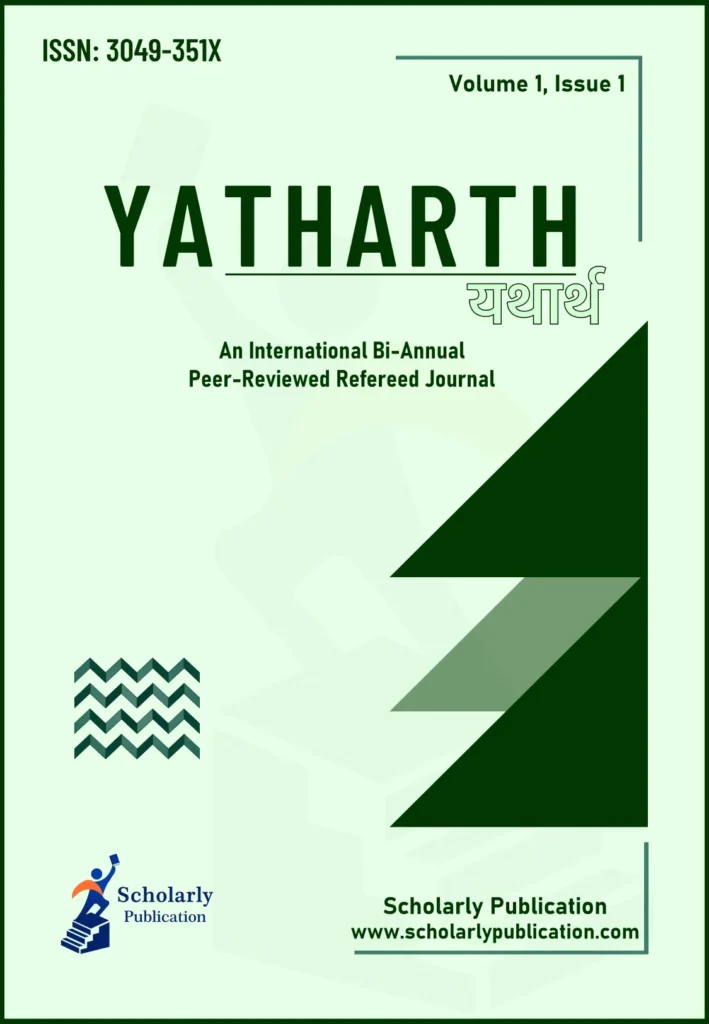Impact of Parental Encouragement on Optimistic and Pessimistic Tendencies among Senior Secondary Students
Volume 1, Issue 1, Article Number: 251004 (2025)
Home >> Yatharth >> Volume 1, Issue 1
1Department of Education, Banasthali Vidyapith, Rajasthan, India
*Corresponding Author: aartivats20@gmail.com
Received: 23 January 2025 | Revised: 02 February 2025
Accepted: 04 February 2025 | Published Online: 06 February 2025
DOI: https://doi.org/10.5281/zenodo.15106605
© 2025 The Authors, under a Creative Commons license, Published by Scholarly Publication
Abstract
This study examines the effects of encouragement from parents on the optimistic and pessimistic inclinations of students in senior secondary schools. Using a survey with 384 participants, the association between parental encouragement and emotional inclinations was measured using correlation and regression analyses. There were also findings to suggest a significant positive correlation between encouragement from parents and optimism (r = 0.579, p < 0.01) and negative with pessimism (r = 0.646, p < 0.01). Regression analysis suggests that the effect of encouragement from parents explained about 41.8% variance in pessimism (R² = 0.418, p < 0.001) with a very significant association. Reliability tests further validate the strength of constructs while the values of Cronbach’s Alpha range between 0.738 and 0.847. Descriptive statistics indicate that optimism scores have a positive magnitude M = 3.5370, more than that of the pessimism scores, M = 2.4813, which indicates an overall prevalence of positivity. Future studies can also focus on intervention schemes that engage parenting and other variables like peer influence and socio-economic status. This study highlights the value of programs aimed at guidance from parents in adolescents’ psychological development, such as mainstreaming the role of parents in learning and development environments.
Keywords
Parental encouragement, Optimism, Pessimism, Emotional well-being, Senior secondary students
References
- Akhter, A., & Pandey, S. (2018). A study of parental encouragement on the academic achievement of secondary level students in J & K. International Journal of Advanced Educational Research, 3, 500–503.
- Ali, R. (2024). Study Involvement and Academic Achievement of Secondary Students in West Bengal. Research Review International Journal of Multidisciplinary, 9, 110-118.
[View Article] [Google Scholar]
- Bhatia, A. K., & Mishra, H. (2024). An Examination of Optimism/Pessimism and Locus of Control in Adolescents and Educators: Implications for Academic Achievement and Well-Being. International Journal For Multidisciplinary Research, 6, 1–9.
- Carver, C. S., & Scheier, M. F. (2014). Dispositional optimism. Trends in Cognitive Sciences, 18, 293–299.
[View Article] [Google Scholar]
- Castro-Schilo, L., Taylor, Z. E., Ferrer, E., Robins, R. W., Conger, R. D., & Widaman, K. F. (2013). Parents’ optimism, positive parenting, and child peer competence in Mexican-origin families. Parenting, 13, 95–112.
[View Article] [Google Scholar]
- Chernyshenko, O. S., Kankaraš, M., & Drasgow, F. (2018). Social and emotional skills for student success and well-being: Conceptual framework for the OECD study on social and emotional skills. OECD Education Working Papers, OECD Publishing, Paris.
[View Article] [Google Scholar]
- Guerra, N., Modecki, K., & Cunningham, W. (2014). Developing social-emotional skills for the labor market: The PRACTICE model. World Bank Policy Research Working Paper, 7123.
[View Article] [Google Scholar]
- Hasan, N., & Power, T. G. (2002). Optimism and pessimism in children: A study of parenting correlates. International Journal of Behavioral Development, 26, 185–191.
[View Article] [Google Scholar]
- Jackson, S., & Goossens, L. (2006). Handbook of adolescent development. Psychology Press.
- Kennedy, T. J., & Sundberg, C. W. (2020). 21st century skills. In: Akpan, B., Kennedy, T. J. (eds) Science Education in Theory and Practice: An Introductory Guide to Learning Theory, Springer Texts in Education. Springer, Cham.
[View Chapter] [Google Scholar]
- Kennes, A., Peeters, S., Janssens, M., Reijnders, J., Simons, M., Lataster, J., & Jacobs, N. (2021). Optimism and mental health in adolescence: A prospective validation study of the Dutch Life-Orientation Test-Revised (LOT-RA) for adolescents. Psychologica Belgica, 61, 104.
[View Article] [Google Scholar]
- Lata, S., & Sharma, S. K. (2014). Comparative Study of Optimistic And Pessimistic Attitude of Adolescents in Relation to Their Locality and Parental Encouragement. International Journal of Behavioral Social and Movement Sciences, 3, 83–92.
[View Article] [Google Scholar]
- Lawrence, A. S., & Barathi, C. (2016). Parental Encouragement in Relation to Academic Achievement of Higher Secondary School Students. Online Submission, 2, 1234–1239.
[View Article] [Google Scholar]
- Li, Y., Bressington, D., Wang, S., Leung, S. F., & Mak, Y. W. (2023). Relationship between parental psychological control and optimism among Hong Kong adolescents: The mediating role of self-mastery. Current Psychology, 42, 10115–10122.
[View Article] [Google Scholar]
- Martínez-Correa, A., Reyes del Paso, G. A., García-León, A., & González-Jareño, M. I. (2006). Relationship between dispositional optimism/pessimism and stress coping strategies. Psicothema, 18, 66–72.
[View Article] [Google Scholar]
- Narad, A., & Abdullah, B. (2016). Academic performance of senior secondary school students: Influence of parental encouragement and school environment. Rupkatha Journal on Interdisciplinary Studies in Humanities, 8, 12–19.
[View Article] [Google Scholar]
- Özpehriz, H. S. (2020). Positive prevention theory: The investigation of parenting styles as a predictor of optimism. Research on Education and Psychology, 4, 114–132.
[View Article] [Google Scholar]
- Patrinos, H. A. (2021). The Learning Challenge in the Twenty-first Century. In Media, Technology and Education in a Post-Truth Society: From Fake News, Datafication and Mass Surveillance to the Death of Trust. Emerald Publishing Limited, 39–53.
[View Chapter] [Google Scholar]
- Rand, K. L. (2018). Hope, self-efficacy, and optimism: Conceptual and empirical differences. In Gallagher, M. W., & Lopez, S. J. (eds) The Oxford Handbook of Hope, Oxford University Press, 45–58.
[View Chapter] [Google Scholar]
- Salmela-Aro, K., & Upadyaya, K. (2020). School engagement and school burnout profiles during high school–The role of socio-emotional skills. European Journal of Developmental Psychology, 17, 943–964.
[View Article] [Google Scholar]
- Scheier, M. F., & Carver, C. S. (2018). Dispositional optimism and physical health: A long look back, a quick look forward. American Psychologist, 73, 1082.
[View Article] [Google Scholar]
- Segerstrom, S. C. (2006). How does optimism suppress immunity? Evaluation of three affective pathways. Health Psychology, 25, 653.
[View Article] [Google Scholar]
- Shank, D. B., & Cotten, S. R. (2014). Does technology empower urban youth? The relationship of technology use to self-efficacy. Computers & Education, 70, 184–193.
[View Article] [Google Scholar]
- Stoet, G., & Geary, D. C. (2018). The gender-equality paradox in science, technology, engineering, and mathematics education. Psychological Science, 29, 581–593.
[View Article] [Google Scholar]
- Tenenbaum, H. R., & Leaper, C. (2003). Parent-child conversations about science: The socialization of gender inequities? Developmental Psychology, 39, 34–47.
[View Article] [Google Scholar]
- Tras, Z., SUNBUL, M. G., & Baltaci, U. B. (2021). Investigation of the relationships between optimism, perceived social support, and hope. e.: Inquiry in Education, 13, 11.
[View Article] [Google Scholar]
- Usán Supervía, P., Salavera Bordás, C., & Murillo Lorente, V. (2020). Exploring the psychological effects of optimism on life satisfaction in students: The mediating role of goal orientations. International Journal of Environmental Research and Public Health, 17, 7887.
[View Article] [Google Scholar]
- Wang, I. Y., & Cheung, R. Y. M. (2023). Parents’ gender role attitudes and child adjustment: The mediating role of parental involvement. Sex Roles, 89, 425–441.
Cite This Article
A. Vats and V. Goswami, “Impact of Parental Encouragement on Optimistic and Pessimistic Tendencies among Senior Secondary Students,” Yatharth 1(1) (2025) 251004. https://doi.org/10.5281/zenodo.15106605
Rights & Permission
This is an open access article published under the Creative Commons Attribution (CC BY) International License, which allows unrestricted use, distribution, and reproduction in any medium, provided the original work is properly cited. No permission is needed to reuse this content under the terms of the license.
For uses not covered above, please contact the Scholarly Publication Rights Department.

